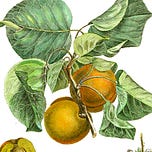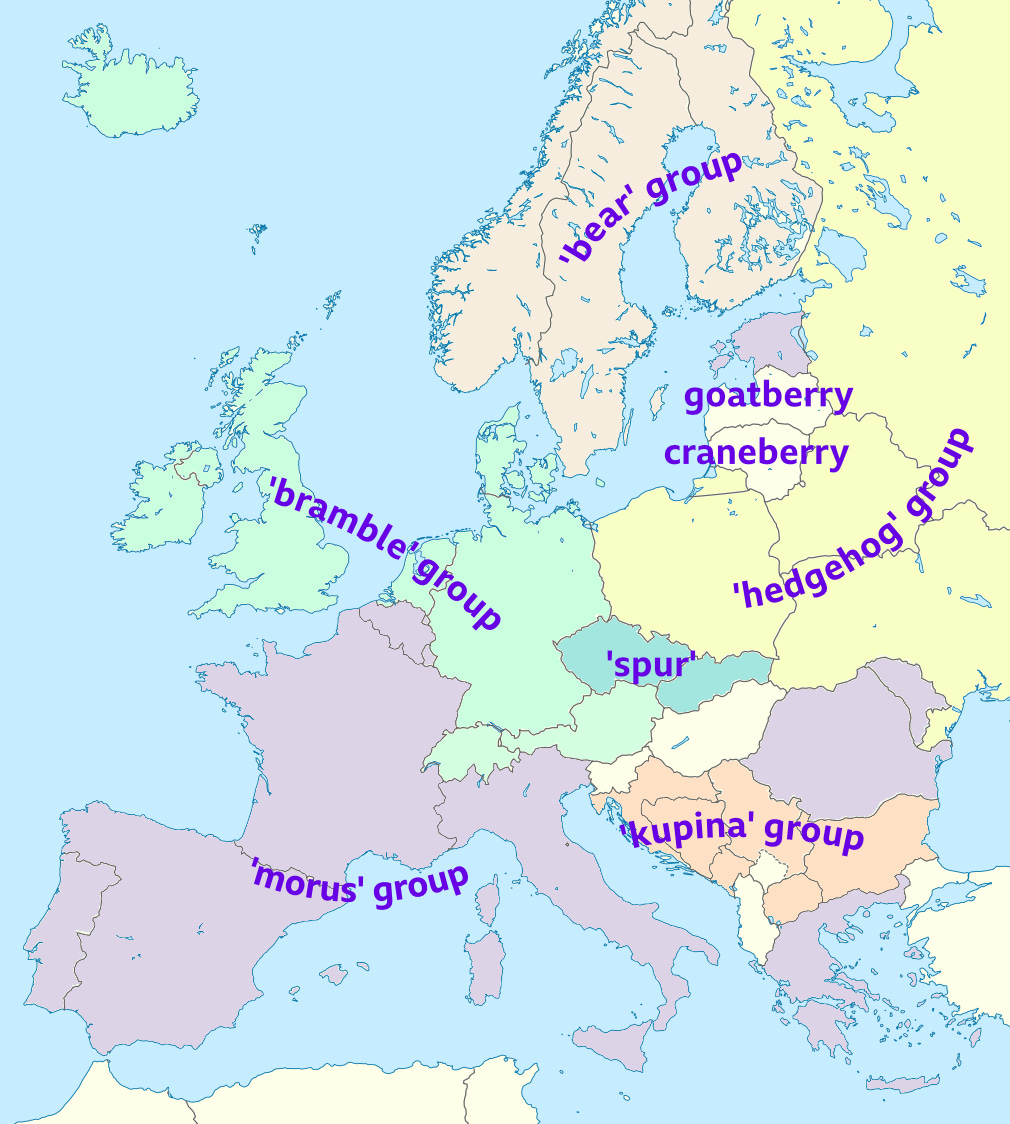“Late August, given heavy rain and sun
For a full week, the blackberries would ripen.
At first, just one, a glossy purple clot
Among others, red, green, hard as a knot.
You ate that first one and its flesh was sweet
Like thickened wine”
Seamus Heaney’s poem ‘Blackberry Picking’ is a powerful reminder of the adventure of childhood. 1 Like famous Seamus, I grew up in the countryside, and like him went blackberrying, or ’brambling’, gathering fruit with the family on warm summer afternoons. But, perhaps because it is so ‘obvious’, I never questioned the origin of the fruit’s name. Today I’m setting out to correct that omission.
Although blackberry has a clear enough lineage, from black and berry, the two words appear as a combination only a handful of times in Old English, and even then it’s not clear to which fruit they refer.
For example, in one 10th century glossary, the Anglo-Saxon blaceberie is translated as Latin morus. Fair enough, as morus is also the origin of the name of blackberries in most Latin languages: Italian and Spanish mora, French mûre, and Portuguese amora (as usual showing a little Arabic influence). But although ultimately these all come from an Indo-European root meaning ‘black’, it seems that morus originally referred to a completely different fruit, the mulberry.
Similarly, the 12th century Durham Plant-Name Glossary translates blaceberie as vacinia, which elsewhere is used to mean ‘bilberry’. In short, we can’t be certain that the Old English blaceberie was the same as the present-day English blackberry. 2
The prick of conscience
This makes sense when you realize that the more common Old English name was bræmbel or bræmel (= ‘a rough, prickly shrub’), the ancestor, of course, of our bramble. Its ancestor was the Proto-Germanic *bræmaz, which also gave us that other bushy plant, the broom. And the connection can be heard in the Germanic names for the blackberry: German Brombeere, Dutch braambes, Icelandic brómber and Danish brombær.
To summarize, not all black berries are blackberries, but the ones that grow on prickly plants most definitely are, as Seamus Heaney found out only too painfully:
“We trekked and picked until the cans were full,
Until the tinkling bottom had been covered
With green ones, and on top big dark blobs burned
Like a plate of eyes. Our hands were peppered
With thorn pricks, our palms sticky as Bluebeard's.”
The first definite quotation linking the word blackberries with bramble bushes or briars comes in 1375: ‘Blake-beries þat on breres growen.’ 3 And in the 1555 English translation of a celebrated history of the New World, we also find ‘Bramble busshes bearynge blacke berries or wylde raspes’.
The prickliness of the blackberry bush is not confined to Germanic languages. Czech and Slovak ostružina is derived from ostruha = ‘a spur’. Albanian manaferrë (or ferrëmanzë) means ‘thorny mulberry’. And the Russian ежевика (yizhivika), Ukrainian ожина (ozhyna) and Polish jeżyna are all derived from from the same Slavic root ežь, meaning ‘a hedgehog’.
Of hedgehogs, goats and bears
As well as the extensive hedgehog group, a number of northern European languages associate the blackberry with animals. Finnish karhunvattuka means ‘bear-berry’, as do Swedish björnbär and Norwegian bjørnebær. The Latvian kazenes means ‘goat-berry’, while Lithuanian gervuogė originates in gérvė = ‘a crane’. Curiously that bird is also the original of English ‘cranberry’.
I can’t finish without telling one of the most fascinating stories associated with blackberries. There is a Russian word for a prickly bramble bush, kupina (or купина in Cyrillic script). But this word is not used for any old bush. It refers specifically to the burning bush that miraculously spoke to Moses, as recorded in the book of Exodus. Tradition has it that the actual burning bush — in Hebrew סנה (seneh) — was Rubus fruticosus4, the blackberry.
And this undoubtedly explains why, with the exception of Albania and Slovenia, the Balkan countries of southern Europe all use words derived from kupina to refer to the blackberry.
Heaney, Seamus: ‘Blackberry Picking’, 1966. Available at https://www.poetryfoundation.org/poems/50981/blackberry-picking
Dictionary of Old English Plant Names [online]. Available at http://oldenglish-plantnames.org
"blackberry, n." OED Online, Oxford University Press, December 2021, www.oed.com/view/Entry/19685. Accessed 18 February 2022.
Cheyne, T. and J.S. Black 1903. Encyclopaedia Biblica . Available at https://archive.org/details/encyclopaediabib01cheyuoft/page/n341/mode/2up













Share this post